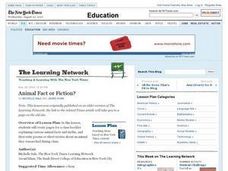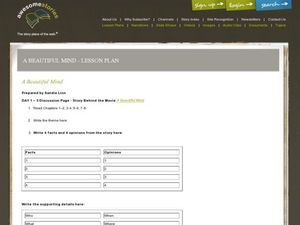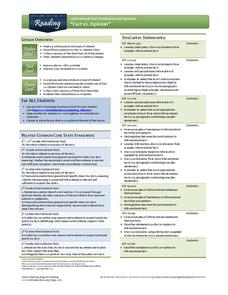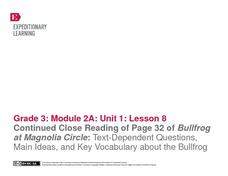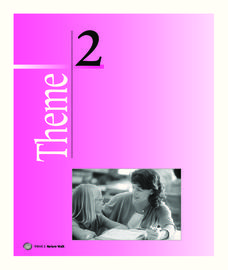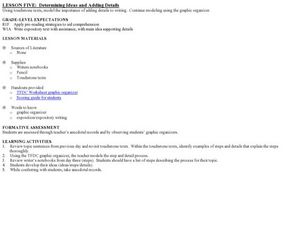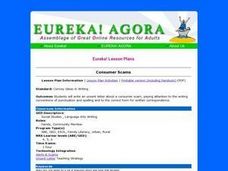Curated OER
Is That a Fact?
Investigate popular scientific claims and gather evidence to defend or argue against an author's stance. Writers synthesize information and compose their own "Really?" columns modeled after those found in the weekly "Science Times"...
Polk Bros Foundation
Science Learning Summary Guide
Apply reading standards to your science curriculum by asking pupils to complete this guide. Individuals note down important vocabulary as well as two ideas they learned and two supporting facts for each idea. They then take this...
Student Handouts
Five Amazing Facts About...
What are five amazing facts about you? Your best friend? Butterflies? The United States? The possibilities are endless with this worksheet!
Curated OER
Topic Sentences and Supporting Facts
Third graders write a paragraph. In this topic sentences lesson students are read the book The Matzah Man: A Passover Story and try Matzah bread in class. Afterward the students write a detailed paragraph about Passover.
Bright Hub Education
Using Evidence and Supporting Details in Writing
In expository writing, it is important to back up claims with evidence and details. Help your class to develop their writing with notes on different types of evidence. Once they have the basics down, practice with a sample thesis and...
Olathe Public Schools
Topic, Main Idea, Supporting Detail, and Theme
Get your class members thinking about a reading passage's topic, main idea, supporting details, and theme with this interactive presentation that asks scholars to define, locate, and review each term.
Curated OER
Animal Fact or Fiction?
Read and discuss the article "Welcome to Cicadaville (Enter at Your Own Risk)" to gain a better understanding around the confusion regarding cicadas and locust swarms. In groups your young analysts research statements about animals to...
Curated OER
A Beautiful Mind: Main ideas and supporting details
This worksheet that accompanies a reading of A Beautiful Mind includes over 20 questions that address theme, fact and opinion, supporting details, characterization, and quote comprehension.
Curated OER
Only the Facts
Practice the strategy of summarizing to gain meaning and knowledge from an informational text. Young readers highlight supporting details and main ideas, and then they use this to summarize two articles: "The Great Quake" and "What is an...
Curated OER
Expository Writing (Informational Brochure)
Design an informational brochure to urge people to move to a specific community. The purpose of this activity is to expose pupils to expository writing. After creating the brochure, they write a three-paragraph persuasive or...
Curated OER
A Walk in the Tundra
Discuss the environment of the Arctic tundra using this resource. The focus of this instructional activity is the story A Walk in the Tundra by Rebecca L. Johnson. The appealing illustrations are bound to captivate your class! After...
Curated OER
Family Life
What is family? Challenge your scholars to write an encompassing definition of what this word means to them. After reading "It May Be a Family Matter, But Just Try to Define Family," class members discuss the emotional issues surrounding...
For the Teachers
Fact vs. Opinion
Many informational texts are written as factual, but can your learners determine when an opinion is presented as fact? Have your kids read several articles on the same topic and record the statements that contain either facts or...
EngageNY
Close Reading of Bullfrog at Magnolia Circle: Text-Dependent Questions, Main Ideas, and Key Vocabulary about the Bullfrog
As your 3rd grade class finishes reading Bullfrog at Magnolia Circle, the eighth lesson plan of this unit helps readers from an understanding of the very specific information on the final page of the book. As with the entire unit,...
Curated OER
It's a Matter of Opinion
Dissect the parts of an advertisement with your class. Middle schoolers discuss advertisements and locate the hook in them. Then, they create an advertisement for a business, in which they include the name of the business, an...
Polk Bros Foundation
How to Summarize a Non-Fiction Passage
After reading a text, one way to find out how much your class comprehended is to ask your pupils to summarize. This worksheet helps class members prepare for writing a summary of a nonfiction text. They note down the topic, up to eight...
Houghton Mifflin Harcourt
Nature Walk: Extra Support Lessons (Theme 2)
Reinforce concepts such as long vowels, spelling patterns, sound clusters, double-final consonants, and syllables with a nature-themed unit. Through a series of extra support lessons, learners compare and contrast using a Venn diagram,...
Curated OER
Persuasive Writing II
Help your young writers use logic in their persuasive writing. Discuss the characteristics of a persuasive paper, and have pupils work together to explore and solve a syllogism. They will write a short persuasive paper which includes a...
K12 Reader
What Would You Change About Your School?
Have your young writers speak their minds with a letter to the principal. Using a writing prompt at the top of the page, kids think about a change that they would like to see at their school. The prompt encourages them to consider...
Curated OER
Determining Ideas and Adding Details
A handy TFDC (topic/fact/detail/conclusion) graphic organizer (included) allows young writers to outline and record their main ideas and supporting details in the prewriting phase. They then continue to add details to the topic sentences...
Curated OER
Persuasive Writing - Anticipating Opposing Views
Persuasion, when used effectively, is a powerful and effective tool. In groups, young writers develop a persuasive letter about something that they would like their parents to allow them to do. Then, independently, they use proper...
Curated OER
Don't Let the Earth Down
Writing a persuasive argument starts with a clear thesis. Using this resource, your class will write a persuasive paper on a conservation issue. They will then transform their argument into a 30-second public service announcement. If...
Curated OER
Convey Ideas in Writing
Use the platforms of the 2004 presidential candidates to bring persuasive writing to your class. Young voters identify the three issues most important to them in the election and research the issues and candidates' positions. They write...
Curated OER
Reliving History through Slave Narratives
Helpful for an American literature or history unit, this lesson prompts middle schoolers to examine slavery in the United States. They read slave narratives that were part of the Federal Writers' Project and then conduct their own...








